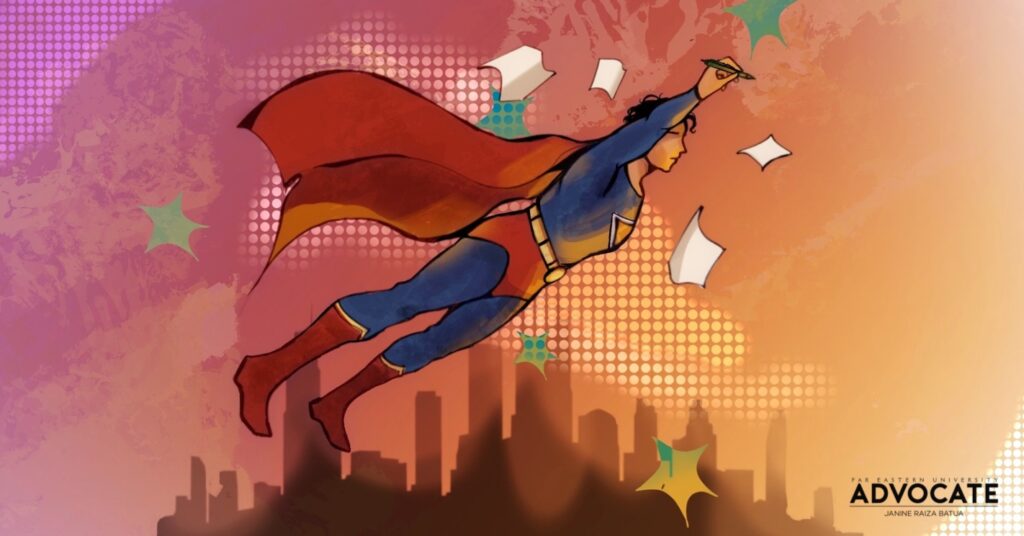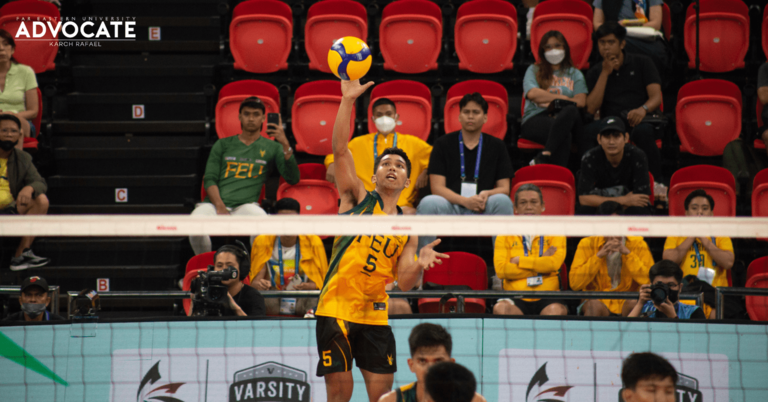
FEU extends losing skid to 2 against NU in a 3-set sweep
- May 18, 2022 05:04
FEU Advocate
July 31, 2025 10:18

By Randy Espares Jr.
#Refreshments: Superman’s comeback in the big screen marked a redefinition in the superhero genre. Audiences who bought cinema tickets expected heroes and villains in capes wielding godly powers. But this film introduced a different kind of hero—who carried neither sword nor shield, but only a pen and the truth.
Director and writer James Gunn’s rendition of the iconic superhero film breaks away from traditional origin stories and dives headfirst into battle. From the very first scene, the tone is vibrant and more urgent, almost like a comic book, but it sets up a more human take on the Man of Steel.
Superman, played by David Corenswet, is thrust into a brutal showdown with a formidable new villain, the ‘Hammer of Boravia.’ Unfortunately for the Kryptonian, he suffers his first major defeat, which the film highlights.
This incident unfolds after Superman intervenes in a conflict between the fictional countries of Boravia and Jarhanpur. With the latter on the verge of an invasion despite its limited resources, Superman steps in and threatens Boravia's president to back down.
The film then cuts to Clark Kent, Superman's alter ego who works as a reporter for ‘The Daily Planet,’ a newsroom that proves to be more than just a mere workplace. It’s a battleground of truth and a key ally in his fight ahead.
At the center of it is Lois Lane, played by Rachel Brosnahan, whose journalistic tenacity matches Superman’s prowess. As political tensions rise and the mysterious Hammer of Boravia looms large, she pieces together the puzzle with fearless resolve—digging up intel, chasing leads, and even breaking Superman out of a pocket dimension created by the evil genius Lex Luthor, played by Nicolas Hoult, even if it meant putting her own life on the line.
It was Lane and her quest for questioning everything that led her to connect the dots, revealing that Luthor was in cahoots with the Boravian president by providing military power to conquer Jarhanpur, in exchange for land promised to the supervillain.
This covert alliance between Luthor and Boravia echoes modern conflicts, where foreign powers back regional leaders or factions, like in Eastern Ukraine or the Israel–Gaza crisis, to gain territory or advance ideological aims.
Lois wasn’t alone in her mission to uncover the truth. Before Metropolis was torn in half by the pocket dimension, her Daily Planet colleague Jimmy Olsen, played by Skyler Gisondo, reluctantly used his sources to help. Together with other reporters, they figured out the connection behind the Boravian conspiracy and raced to get the story out. In a tense sequence, they publish it just as their building collapses during the crisis—highlighting the film’s message that truth-telling can be as heroic as throwing punches.
It is a testament to the relentless drive of journalists to expose the truth, even in real life. Even when danger lies ahead, such as in times of war, typhoons, and other disasters, they will write a headline and put a byline for the sake of the people they serve.
Additionally, Lane’s words in her article were precise. She called the Boravian president a “dictator,” with each sentence she spoke a pointed jab at the villains and a beam of truth cutting through the chaos between the warring fictional countries.
While the Boravia–Jarhanpur war may be fictional, the apartheid between Israel and Gaza is not. In both cases, questions of power imbalance, civilian suffering, and narrative framing are crucial.
Yet, comparing them requires care. The resemblance, if any, is not in geopolitical specifics but in how conflicts are reported, especially when one side wields significantly more military or political power than the other.
In such environments, journalism is not just about facts; it becomes a matter of ethical responsibility. Journalists must navigate a difficult landscape while reporting with accuracy and moral clarity.
This is where journalists like Lois Lane become relevant, not for her fictional heroics, but for her refusal to mask the truth.
Such an instance is the Al Jazeera Media Institute, which has noted that some news outlets often use vague language like “clashes” or “exchange of fire,” even when reporting on events where most casualties are Palestinian civilians, including children. This framing can obscure responsibility and minimize the human cost.
It was also revealed in the film that Luthor deliberately spreads disinformation against Superman to lower his morale, ruin the public's trust in him, and further fuel the ongoing geopolitical turmoil.
This mirrors real-world tactics such as Russia’s disinformation campaigns during the Ukraine conflict, where false narratives were used to discredit Ukrainian leadership and sow confusion both domestically and abroad.
Locally, the 2022 presidential elections which was won by the son of the former dictator, Ferdinand ‘Bongbong’ Marcos Jr., were said to have been influenced by troll farm tactics to sway Filipino voters.
If not for the intervention of the journalists of The Daily Planet through persistent fact-checking, Superman’s efforts would have faltered.
However, drawing loose parallels between fictional wars to real ones can risk oversimplification. But they can be instructive if used with care like in the film, not as metaphors, but as mirrors to interrogate how we narrate war and how journalists can aid in putting it to a stop.
Although some of Kent’s actions as a reporter are questionable, such as conducting interviews with himself and giving exclusive scoops to his girlfriend Lois, the film is still a strong reminder of the importance of the profession in the age of fake news and deliberate propaganda.
In the real world, where trust in journalists and media outlets is declining, it further proves why the media remains as the fourth pillar of democracy.
The movie shows that evil shall never prevail. It touches on the effect of hope, with beacons such as Superman embodying the true spirit of being kind by respecting all forms of life, even those as small as a squirrel.
Justice is also a central theme in Superman—and with justice comes the truth. The film successfully highlights this by emphasizing the role of truthful storytelling and accountability in a world shaped by power and perception.
These attributes of reporters are not just part of the plot but core attributes Clark Kent himself stands for; after all, he is a journalist.
(Element by Janine Batua/FEU Adovcate)









